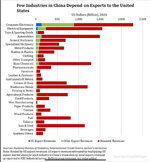They still are reliant on our consumerism to a large degree. Until the world's reserve currency changes (which would mean collapse of the euro as well) this means they are dependent on us continuing to trade and enrich them.
China is a paper tiger in a lot of ways being that they are a communist country and are subject to a lot do centralized planning issues that occurs in all communist countries.
Currently they benefit from elite capture with some countries in the West.
You're correct that both the US and China are decoupling.
We are strengthening relationships with Australia for instance military deals to protect rate earth minerals.
Centralized industrial planning has been a feature in Japan and S Korea as well, look up MITI and its role in Japanese industrial growth.
The Chinese model is misunderstood, because it does rely on market forces. Their government sets the agenda and creates favorable conditions for industrial growth, overseeing infrastructure, higher education, healthcare etc but it doesn't actually run industries.
For example, their government established EV production as a national priority and deemphasized real estate/construction with their RE market glutted. So EV companies received lower interest loans, and you had an explosion of EV and battery companies across China, over 500 companies competing against each other. The marketplace eventually crowned the winners as big companies with superior products and management emerged (BYD, Geely, NIO, Xiaomi...)
The Chinese EV industry has been wildly successful and this success was the result of a state policy working with market forces. Bottom line, this is not a Soviet-style top down economy.
They still are reliant on our consumerism to a large degree.
The US market represents ~14% of Chinese exports, so not a negligible percentage, but not the end all be all either. As well trade between China and other countries is increasingly conducted in Yuans.
Currently they benefit from elite capture with some countries in the West.
Yes, US policy is run by Blackrock and hedge funds like KKR or Elliott Management, whose interests do not align with those of most Americans.

